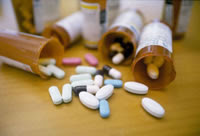 The South African-born French rugby player, Tommy Conlon Pieter de Villiers, has pleaded innocence after being accused of using drugs.
The South African-born French rugby player, Tommy Conlon Pieter de Villiers, has pleaded innocence after being accused of using drugs.
Villiers accidentally ended up with a cocktail of cocaine and ecstasy coursing through his bloodstream after he and his Stade Francais teammates went out for a feed of drink after a win over Harlequins.
From Independent.ie:
"I might have fallen into a trap," he said last week, "but I have never knowingly taken cocaine or ecstasy."Ah yes, "knowingly." No statement by any athlete caught with his or her steroids down is complete without the knowingly protocol. And these days it is met only with knowing nods of disbelief from all but the incurably innocent.De Villiers would have played against England next weekend but at 30, his international career may be over.If he was playing for Australia he might have had a better chance of getting away with it. In March 2001 the Australian wing Ben Tune took the banned drug Probenecid. Tune claimed he used it for a gash on his knee that was not responding to antibiotics.Probenecid has powerful healing properties when used in conjunction with antibiotics. It is primarily used by power athletes as a masking agent for anabolic steroids. His medical advisers claim to have prescribed it and subsequently informed the Australian Sport Drug Agency. He played two Super 12 games before ASDA contacted the Australian Rugby Union.
If his statement is any thing to believe, Pieter de Villiers probably had received an unfair deal after receiving a ban of two years after a random test.








